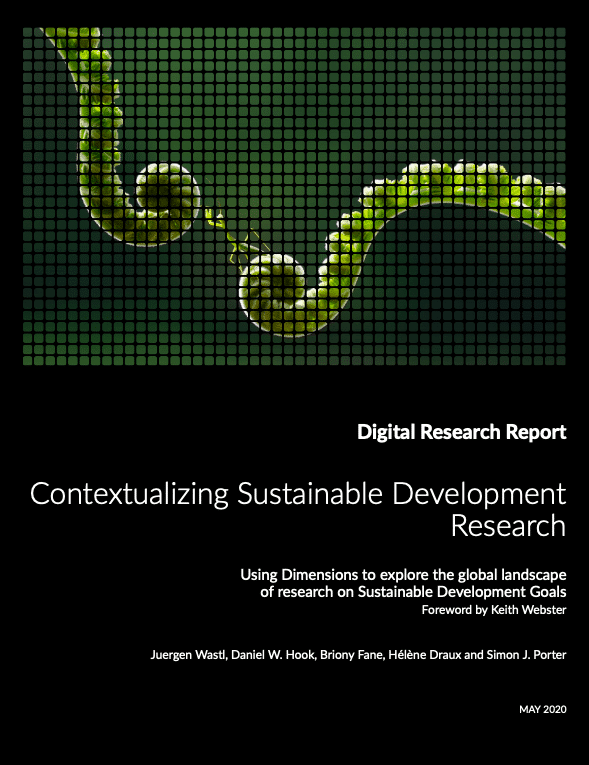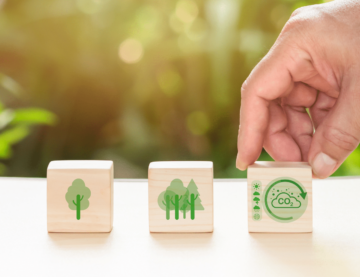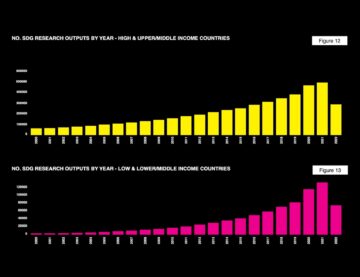Subscribe to our newsletter
The Pursuit of Happiness – Researching Good Health and Well-Being
March 20th is celebrated around the world as the International Day of Happiness. This day of celebration and learning was founded by the United Nations back in 2012, and this year is no exception, as the UN released their latest Happiness Report. As part of our SDG blog series on the research driving us closer to meeting the UN’s Sustainable Development Goals (SDGs) we asked Digital Science’s very own Well-Being Trainer, Danielle Feger, to tell us more about the science behind SDG 3, Good Health and Well-Being, and how to use the powers of positive psychology to keep us centred in the midst of a global pandemic. With thanks to Juergen Wastl for his assistance in delving into Dimensions to uncover the hottest trends in happiness research.
About the Authors
As a stress counsellor and wellbeing trainer, Danielle developed her own well-being concept, Equillbrium4Wellbeing, which is based on Cognitive Behavioural Therapy, Mindfulness and Yoga. She leads the well-being programme at Digital Science and runs workshops on stress management and well-being in the UK as well as in German-speaking countries. Her programmes support employees’ mental well-being, helping them to shift from ‘coping’ to ‘thriving’.
Previously, Danielle had a long career in research development at the University of Cambridge where she gained extensive experience in fundraising and managing international research projects. In addition, she had the opportunity to coach researchers and academics and has established a mentoring programme for early-career researchers.
Juergen Wastl is Director of Academic Relations and Consultancy at Digital Science. He previously headed up the Research Information team at the University of Cambridge’s Research Strategy Office and worked for BASF managing BMBF-funded projects internationally.
The History of Happiness Research
Zhuangzi, who was born about 2,300 years ago in China, probably wrote the first piece of work in history devoted to happiness; an essay called “Supreme Happiness”. Since then, a total of almost 39k research publications on happiness have been added to this corpus of knowledge. Figure 1 shows how many publications have been released each year over the last 25, and the steady increase in the rate of research outputs relating to happiness, where the word “happiness” features in the title and abstract of the publication.
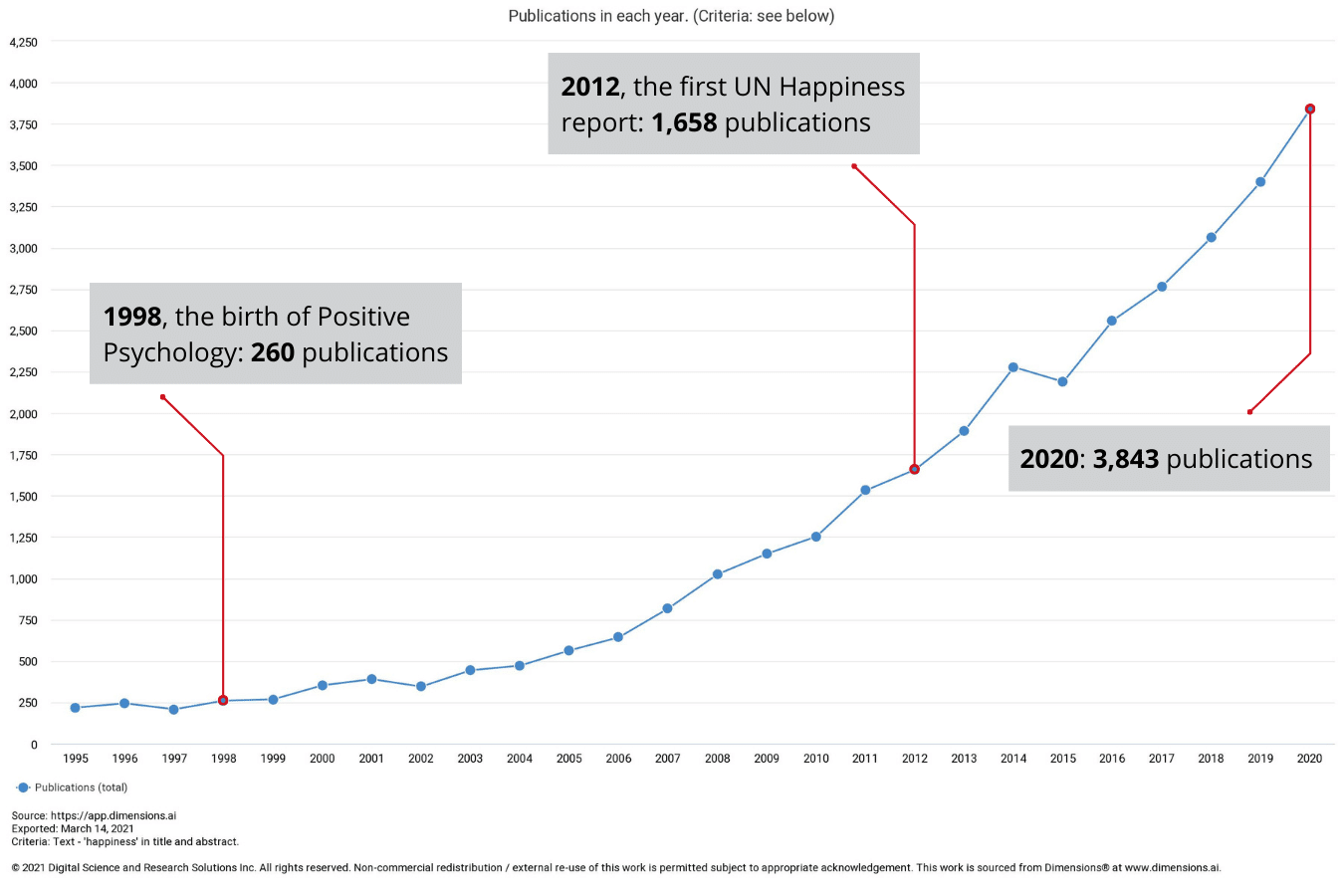
Happiness is a human emotion, but does happiness research take place wherever there are people? Not quite. Figure 2 shows the global distribution of publications relating to happiness. The US has had the highest overall happiness research output with about 7,700 publications, followed by the UK with almost 2,700. China (with 1,386), Canada (with 1,375) and Germany (with 1,257) make it a close-run race for 3rd place, while other countries such as Australia, the Netherlands, and Japan are hot on their heels.
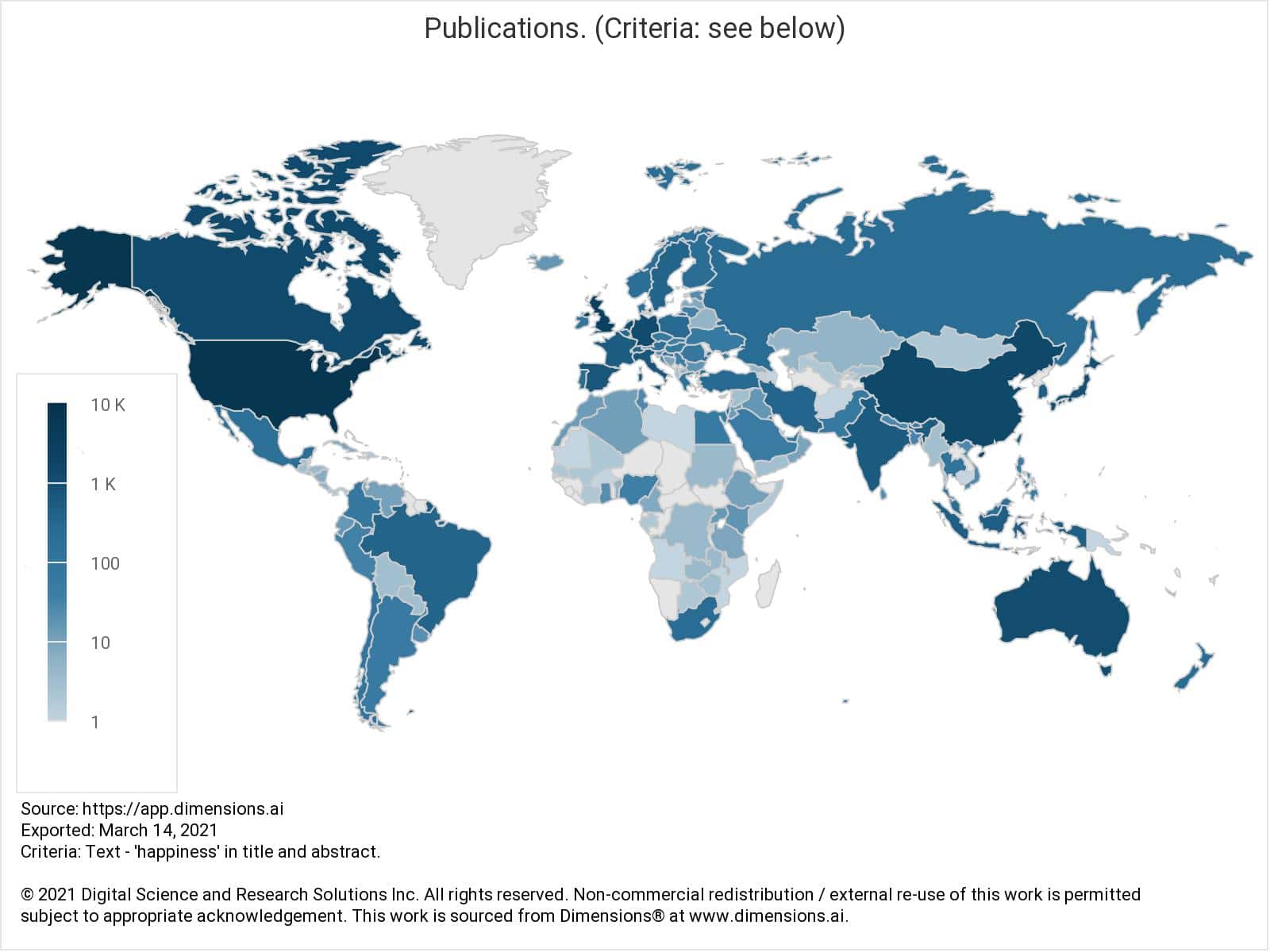
In recent years, the increase in the number of publications relating to happiness outpaced the general increase of publications overall: Between 2017 to 2020, the number of happiness-related publications increased by 27.5%, whereas the general increase was 19.6%.
Measuring the Impact of Happiness Research
The impact of happiness research can be measured in traditional citations as well as in alternative metrics (or altmetrics) that track the real-world attention received by a piece of research. When we look at publication citations, we can see there have been 350,000 citations of research from US publications, 92,000 from UK publications, and 47,000 from Canadian publications. It is interesting to note that, although China has published a comparable amount of research around happiness within Canada, citation of this work is much lower at 14,000. Is this down to a research language barrier, or something else?
When we track the volume of research publications over time, we see that research into happiness and subsequent publications start increasing significantly in the early 2000s. This interest in happiness is connected to the study of Positive Psychology.
Positive Psychology
For about 200 years, Psychology research mainly focused on the study of disease. In the 1990s, psychologists started to look at what increases well-being and what makes people happier. Since its beginning, Positive Psychology has developed significantly; millions of dollars have been invested in research, and thousands of findings have been published.
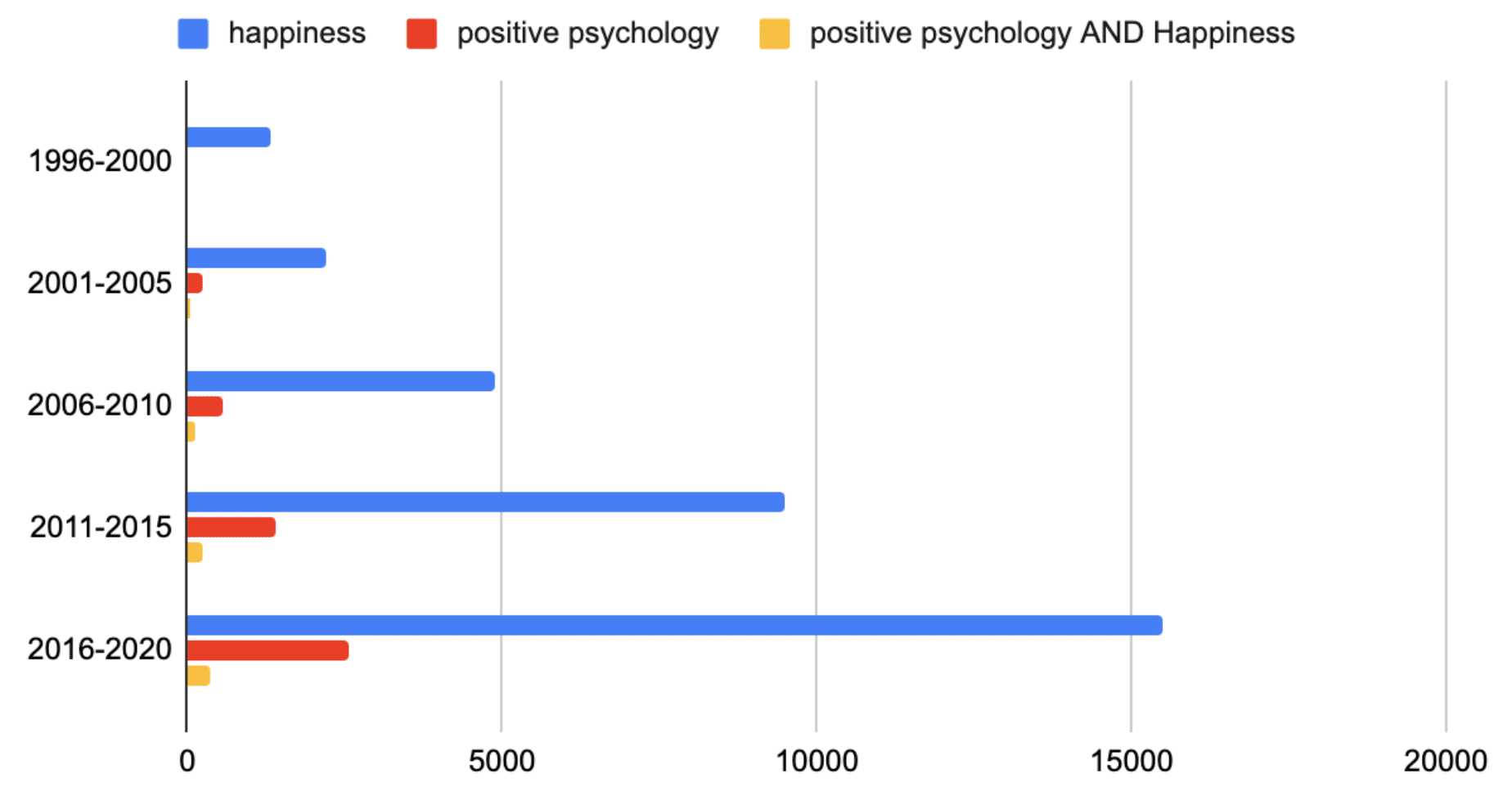
The focus on happiness is growing everywhere: Countries adopt happiness policies, companies and educational institutions introduce wellbeing and happiness programmes, and books about happiness are regularly on bestseller lists. The team at Digital Science understand the value and importance of employee happiness and have invested in boosting well-being among their employees through a range of courses and sessions led by my organisation.
The UN Happiness Report 2020 and Sustainable Development Goals
Chapter 6 of the 2020 World Happiness Report takes a close look at the link between SDGs and happiness and shows that the countries with a higher SDG index score tend to do better in terms of subjective well-being.
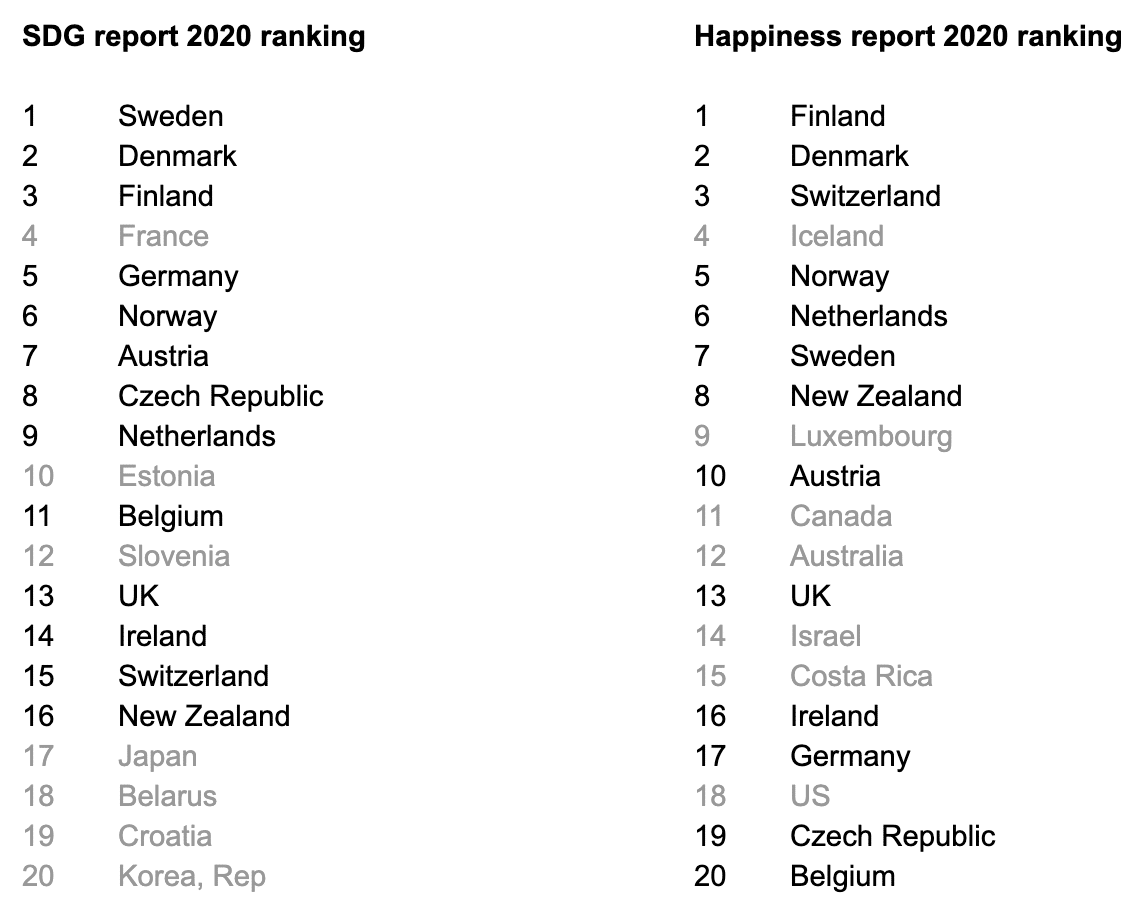
If we ask people what their ultimate goal is in life, most would say they want to be happy. Happiness is something we all strive to find. We believe that we will be happy once we achieve certain things like status, higher income or more possessions. However, research has shown that these things do not increase our happiness. Happiness is a state of inner fulfilment, not the gratification of inexhaustible desires for outward things.
So how do we achieve happiness?
One of the main points I teach in my programmes is to embrace experiences. Plenty of research findings show that experiences can increase our happiness. Let’s break this down from the perspective of positive psychology, to better make sense of the things that make us happy – and how we can achieve a greater sense of well being and happiness.
Danielle’s Guide to Achieving Happiness Through Experiences
1. There is no hedonic adaptation to experiences
We adapt quickly to possessions: Whenever we get what we are seeking, it quickly becomes less valuable, so we return to our original baseline of happiness and the cycle repeats like a treadmill. Experiences are temporary and there is no time to get used to them. Since the stimuli in experiences aren’t constant, we keep paying attention to them.
2. Experiences cannot be quantified or compared
Possessions foster comparisons but we tend to think of experiences more on their own terms, rather than in comparison with other things. Experiences are so individual that we have no reference points to compare them to or to quantify the relative value of any two experiences.
3. Experiences give us unforgettable memories and increase positive emotions such as joy, inspiration, pride, confidence or gratitude
According to Barbara Fredrickson, when people experience positive emotions, their minds broaden and they open up to new possibilities and ideas. At the same time, positive emotions help people build their personal wellbeing resources, ranging from physical, to intellectual, to social resources.
4. Experiences increase our engagement and enhance our sense of achievement
Activities that meet our need for engagement flood the body with positive neurotransmitters and hormones that elevate our sense of happiness. ‘Flow’ engagement stretches our intelligence, skills, and emotional capabilities. Achievement is not just about a strong sense of success or ‘winning’ – it also refers to how much we challenge ourselves in positive and progressive ways that enable us to further develop our strengths and skills, both practically and emotionally.
5. Experiences help us connect with people and improve social relationships
Relationships and social connections are a crucial part of our sense of wellbeing and happiness. Sharing experiences connects us to other people more than sharing consumption. Since experiences are very individual, jealousy and envy aren’t as much of an issue as with possessions. Therefore we are more interested in hearing about other people’s experiences than about their latest purchases.
6. Experiences help define our purpose and passions
We are the sum total of our experiences or as Oliver Wendell Holmes put it: “A mind that is stretched by new experiences can never go back to its old dimensions.” A new iPhone doesn’t define who we are, but having travelled in various countries truly enriches our lives and forms our identity.
Further Reading
- “Buy Experiences, Not Things” The Atlantic
- The UN Happiness Report
- Richard Layard, co-editor of the annual World Happiness Report (with Jeffrey Sachs and John Helliwell) is also co-founder of the movement “Action for Happiness” that brings together like-minded people from all walks of life and helps them take practical action, drawing on the latest scientific research. AfH is backed by leading experts from diverse fields including psychology, education, economics and social innovation.


